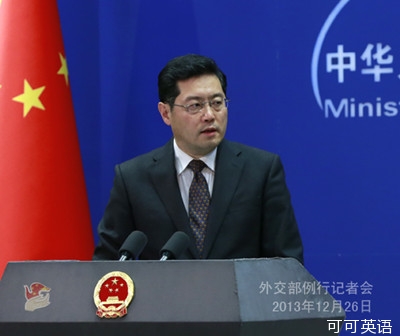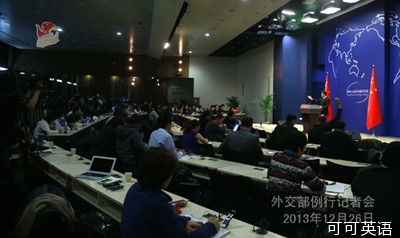2013年12月26日,外交部发言人秦刚主持例行记者会。
Foreign Ministry Spokesperson Qin Gang held a press conference on December 26, 2013.
问:日本首相安倍晋三今日参拜靖国神社后称,他参拜是为了向为国家战斗和牺牲的英灵致以哀悼之意,日本的和平繁荣建立在他们的牺牲基础之上。安倍还称战后日本建立了自由、民主的国家,一直坚持和平发展道路,将继续为世界和平、稳定和繁荣履行责任。中方对此有何评论?
Q: Japanese Prime Minister Shinzo Abe said after his visit to the Yasukuni Shrine that he was to express condolence to those departed who fought and died for their country and that the peace and prosperity Japan enjoys is based on their death. Abe further claimed that Japan became a country of freedom and democracy that adhered to peaceful development after WWII and that it would keep fulfilling its obligation to world peace, stability and prosperity. What is China's comment?
答:关于日本军国主义发动的那场侵略战争,历史早有定论。请问,那些战场上倒下的日本军人为谁而死?靖国神社供奉的二战甲级战犯为什么要受到正义的审判?建立在他们基础上的和平与繁荣到底是什么样的和平与繁荣?日本领导人说出这样的话,完全是阳奉阴违,颠倒黑白,混淆视听。日本一些政客一方面把民主、自由、和平挂在嘴上,另一方面为军国主义扬幡招魂,美化对外侵略和殖民历史,这恰恰是亵渎了民主、自由与和平。
A: History has already come to a conclusion on the war of aggression waged by the Japanese militarism. Who did the Japanese soldiers die for on the battlefield? Why should the Class-A Second World War criminals enshrined in the Yasukuni Shrine be subject to just trials? What kind of peace and prosperity is built upon their death? What the Japanese leader said is completely duplicity which confuses right and wrong and misleads the public opinion. Some Japanese politicians, on one hand pay lip service to democracy, freedom and peace, on the other hand, call back the ghost of militarism and whitewash Japan's history of aggression and colonialism. This is precisely an affront to democracy, freedom and peace.
我们必须指出,军国主义阴魂不散,没有勇气正视历史,不敢对历史负责,公然挑战历史正义和人类良知,挑战二战结果和战后国际秩序,有什么资格谈论自由与民主?有什么资格为世界和平与繁荣履行责任?
We must make it clear: for those who are under the evil influence of militarism, who have no courage to face up to history and take responsibility and who blatantly challenge historical justice and human conscience and defy the outcome of WWII and the post-war international order, what entitles them to talk about freedom and democracy? How can they fulfill the obligation to world peace and prosperity?

问:第一,中国副总理刘延东取消了今天下午会见日中友好议员联盟的活动,这是否是对安倍晋三参拜靖国神社的抗议?第二,中方除抗议外还将采取什么措施?
Q: First, Chinese Vice Premier Liu Yandong cancelled her meeting with the Association of Dietmen League for Japan-China Friendship. Is this a protest against Abe's visit to the Yasukuni Shrine? Second, what other measures will China adopt other than protest?
答:你提到的这两个问题,我一并作答:安倍参拜靖国神社破坏了中日关系的政治基础,也为两国关系改善和发展制造了新的严重障碍,日方将要为此承担所产生的一切后果。
A: You raised two questions and I will answer them together. Abe's visit to the Yasukuni Shrine jeorpardizes the political foundation of China-Japan relations and erects new barriers to the improvement and growth of bilateral relations. The Japanese side must take all the consequences arising therefrom.
问:安倍晋三在参拜靖国神社后称,他对参拜靖国神社已成为政治和外交问题感到遗憾,他完全没有伤害中、韩人民感情的想法,希望对中、韩怀着敬意,构建友好关系。中方对此有何评论?
Q: After his visit to the Yasukuni Shrine, Abe expressed regret that visiting the shrine has become a political and diplomatic issue. He said that he utterly had no intention of offending the Chinese and ROK people, rather, he wants to build friendly relations with China and ROK with respect. What is China's comment?
答:我要指出,靖国神社问题的实质是日本能否正确认识和深刻反省日本军国主义侵略历史。它事关日本与亚洲邻国的关系,事关中日关系政治基础,事关二战结果和战后国际秩序,事关亚洲乃至世界的和平与稳定。我还要指出,日本政府和领导人在历史问题上是作出过表态和承诺的。安倍参拜,严重违背中日四个政治文件的原则和精神,这当然是政治和外交上的大是大非问题。
A: I want to point out that the issue of the Yasukuni Shrine, in nature, is about whether Japan can adopt a correct view of and repent the history of aggression by the Japanese militarism. It concerns Japan's ties with its Asian neighbors, the political foundation of China-Japan relations, the outcome of WWII and the post-war international order and the peace and stability of Asia and beyond. I also want to point out that Japanese administrations and leaders have made statements on and commitments to the issue of history. Abe's visit grossly violates the principle and spirit of the four political documents between China and Japan. It is undoubtedly a major political and diplomatic issue of right and wrong.
如果安倍真的对邻国怀有敬意,真心想改善同亚洲邻国的关系,他就不应该去靖国神社,而应该去侵华日军南京大屠杀遇难同胞纪念馆。日本只有真正做到以史为鉴,它同亚洲邻国的关系才有未来。
If Abe truly respects Japan's neighbors and really wants to improve relations with Asian neighbors, he should go to the Memorial Hall for Compatriots Killed in the Nanjing Massacre by Japanese Forces of Aggression, rather than the Yasukuni Shrine. Only if Japan truly regards history as a mirror can it has a future in its relations with its Asian neighbors.

问:中方是否考虑召回驻日大使?
Q: Does China consider recalling the Chinese Ambassador to Japan?
答:关于安倍参拜靖国神社,中方将在北京和东京分别向日方提出严正交涉和强烈抗议。
A: Regarding Abe's visit to the Yasukuni Shrine, China will lodge solemn representations with and strong protest against the Japanese side in Beijing and Tokyo.
问:今天是毛泽东主席诞辰120周年纪念日。中方对日本领导人选择在这一特殊时间参拜有何回应?
Q: We commemorate Chairman Mao Zedong's 120th birthday today. What is China's response to the Japanese leader's visit to the Yasukuni Shrine on such a particular day?
答:今天是毛泽东同志诞辰120周年纪念日。此时此刻,我们特别想起在1938年中国人民抗日战争正处在艰苦卓绝的时候,毛泽东同志在《论持久战》的演讲中说:中国是大国,进步、多助,最后的胜利属于中国。
A: Today marks the 120th birthday of Chairman Mao Zedong. This very moment reminds us of the year 1938 when the Chinese people were fighting arduously against the Japanese invasion. Comrade Mao Zedong said in his speech On Protracted War: China is a very big country. There is broad international support for China stemming from the progressive and just character of her war. The final victory will go to China.
更多精品翻译素材,敬请关注可可英语。











